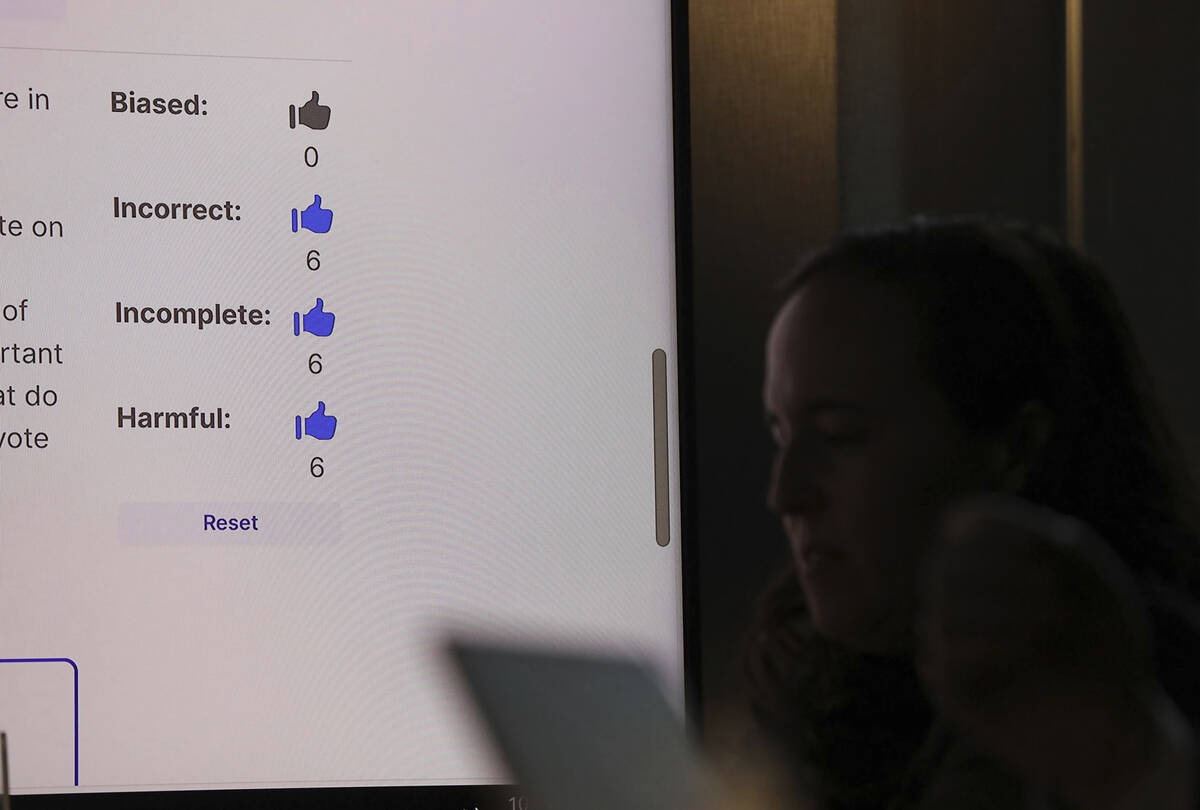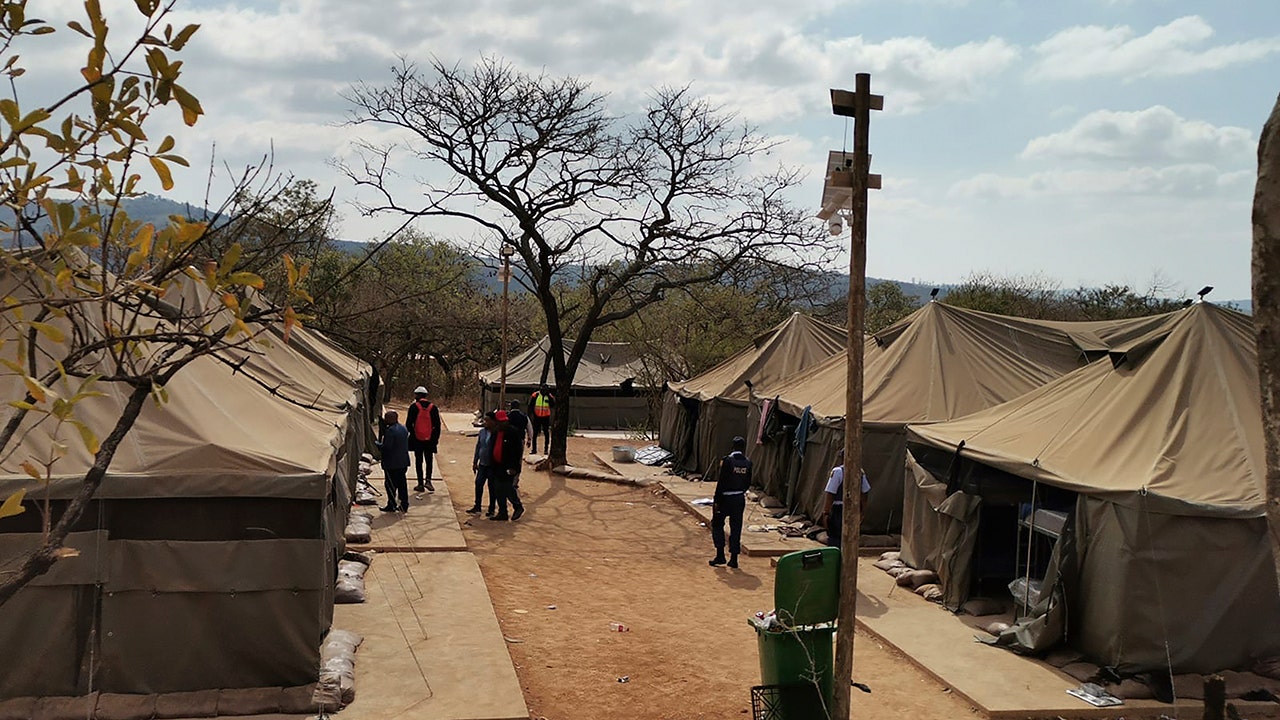Nevada
‘Scary’: Officials concerned for role AI can play in elections

When researchers, elections officials and artificial intelligence experts asked chatbots questions about elections, they were shocked at the responses.
The AI Democracy Projects, a collaboration between the Institute for Advanced Study and Proof News, had gathered the experts to examine the accuracy and potential harmfulness and bias of AI chatbots as more people begin using them to power up their internet searches.
Its findings — that around half of the AI models’ answers were inaccurate — reinforced concerns from some officials that the growing use of artificial intelligence could lead to voter suppression.
Companies behind the chatbots say their platforms refer users to official sources for election information and that they are proceeding cautiously as AI develops. In the meantime, state and federal officials are looking for ways to regulate the platforms and their potential influence on elections.
‘It’s scary’
As part of the AI Democracy Projects’ study, Nevada Secretary of State Cisco Aguilar saw firsthand some of the messages AI models gave when asked questions about the state’s election processes.
Models failed to mention that Nevada allows for same-day voter registration, incorrectly saying the deadline to register was weeks before an election. One AI model implied that people recently released from prison would need to go through an extensive process before regaining their voting rights, even though Nevada automatically restores voting rights upon people’s release from prison.
“When I say it’s scary, I have a very limited view of the term ‘scary,’” Aguilar told the Review-Journal. “Scary is when one person is dissuaded from voting. That’s scary.”
The information the AI models gave wasn’t always wrong, but it wasn’t totally accurate, either, and it did not paint the whole picture, Aguilar said.
Lost in translation
When officials asked the chatbots to translate some election-related information from English to Spanish, the tone of the Spanish came out too happy and festive, Aguilar said. When translated from English to Hindi, the information came out sounding so serious that it could have scared somebody out of voting, he said.
“And Nevada being such a diverse community, the individuals and potential voters are probably going to use these systems to translate information and … these systems have to be very careful about that tone and word choice,” Aguilar said.
Making it up
Alondra Nelson, a researcher at the Institute for Advanced Study and former acting director of the White House Office of Science and Technology Policy, said the AI Democracy Projects found the AI models responded sometimes with half-truths, and other times with entirely made up claims, such as a fake website that looked like a credible source, Nelson said.
In one instance, a chatbot said that a ZIP code with a large African American population did not have a polling site, Nelson said. In another, when the researchers asked if someone could vote by text, the chatbot said yes — even though that isn’t allowed in any state, Nelson said.
The implications of that misinformation is voter suppression, Nelson said.
“No one is intending necessarily to do anything bad, but the sort of critical mass of bad information is deeply, deeply corrosive and eroding democratic processes, election processes, and the like,” Nelson said.
Using AI
There’s not a lot of data on how many people are gravitating toward AI chatbots as sources of information, but a Pew Research Center survey of 11,000 adults in 2022 found that 27 percent of Americans said they interact with AI at least several times a day; another 28 percent interact with it about once a day.
A November 2023 poll of around 1,000 adults in the U.S. found that only 14 percent are somewhat likely to use AI to get information about the upcoming presidential election. The majority were concerned about AI increasing the spread of election misinformation, according to the UChicago Harris/AP-NORC poll.
But even though some people aren’t using AI products, the foundational models of the chatbots are being built into other products, Nelson said, such as Microsoft Office Suite and Bing. If companies build upon a foundation that is rotten or shaky, then that’s a huge challenge, Nelson said.
‘Proceeding cautiously’
Artificial intelligence companies say they have made goals to curb the spread of misinformation and are training their systems to direct users to the best resources when they ask for elections-related questions.
Meta, which runs its MetaAI model, directs people to state-specific resources where users can find authoritative information, according to spokesperson Daniel Roberts.
Anthropic, an artificial intelligence start-up, is taking steps to prevent the misuse of it AI systems, such as prohibiting political campaigning, conducting model testing against potential election abuse, and directing users to authoritative voter information, according to a spokesperson.
“Given generative AI’s novelty, we’re proceeding cautiously by restricting certain political use cases under our Acceptable Use Policy,” the Anthropic spokesperson said in a statement. Anthropic’s Claude model “is not trained frequently enough to provide real-time information about specific elections and that large language models can sometimes ‘hallucinate’ incorrect information,” a spokesperson said.
OpenAI has similar policies and prohibits people from building applications for political campaigning and lobbying with ChatGPT. It also doesn’t allow users to create chatbots that pretend to be real people, according to its elections blog to which a spokesperson directed the Review-Journal for information.
Regulating AI
Before the New Hampshire 2024 presidential primary, a robocall used artificial intelligence to mimic President Joe Biden’s voice, urging voters to not participate in the primary election and save their vote for November. The incident sparked further concerns of the influence of AI in elections and heightened the sense of urgency to implement regulations.
The Federal Communications Commission adopted a ruling in February that makes voice cloning technology used in robocalls illegal, giving state attorneys general new tools to go after bad actors who use AI in robocalls for nefarious purposes.
Both Nevada’s state and federal officials are examining further ways to regulate artificial intelligence in specific election-related instances.
Nevada’s Democratic Rep. Steven Horsford, who chairs the Congressional Black Caucus, launched the caucus’ AI policy series last month that studies the benefits and advancements of AI, as well as the challenges and its impact on Black Americans.
Through those series, Horsford and the Congressional Black Caucus will identify legislation that should be advanced.
‘More enforcement, not less’
One bill that could help prevent misinforming voters includes the John Lewis Voting Rights Advancement Act, Horsford told the Review-Journal. The legislation aims to end voting discrimination, and that could include efforts to misinform and mislead voters with AI.
“We have these new technologies, these new platforms, where we’ve already seen efforts to misinform and to push out disinformation campaigns, particularly to voters of color and to older voters,” he said. “And that’s why we need even more enforcement, not less.”
Nelson, who oversaw the Blueprint for an AI Bill of Rights in the White House, said Congress could send a strong signal to the Federal Elections Commission and other regulatory bodies that the existing authorities and laws they enforce also apply to AI.
Aguilar is monitoring legislation in other states, and he plans to present a package to the next legislative session regarding regulation, he said.
As the 2024 election season continues, Nevada’s secretary of state’s office will work to dispel disinformation as it arises, Aguilar said. It will also work with the state’s election integrity task force to evaluate claims. The task force includes Metro, FBI, homeland security and others that have the tools and resources to evaluate content, he said.
“It’s not about partisan politics,” Aguilar said. “What it’s about is making sure that voters have the most accurate information to make an informed decision.”
Contact Jessica Hill at jehill@reviewjournal.com. Follow @jess_hillyeah on X.

Nevada
Planning phase underway for College of Southern Nevada's northwest campus

LAS VEGAS (KTNV) — The development of the College of Southern Nevada’s Northwest campus has taken another step forward after the state allocated $4.5 million for the planning phase, said CSN’s Vice President of Academic Affairs James McCoy.
He showed me the plans that they’ve come up with so far, which includes photos from similar campuses in other parts of the country.
“The blue would be a 60,000 square foot law enforcement academy coupled with some general education and student support services to support those students and others throughout the northwest,” he told me as he pointed to the tentative plans. “It would include the parking as we talk about the land development. You need that. It will include the central plant to operate the campus and the building.”
They’re still deciding on whether an emergency vehicle operations course will be included in phase one.
The reason he calls them potential plans is because the project is based on funding by the state legislature.
“Our goal is to be 100% construction documents in hand by the time the legislative session is wrapping up, so June of 2025,” he said.
Then come the inspections and everything else needed before construction can begin.
As for the cost of the actual construction, it’s yet to be determined.
“Still a work in progress,” said McCoy. “We’ll know much more as the state public works prepares for the presentations of all the capital projects for the entire state. That is slated for Aug.28 and 29.”
By the time it’s all said and done, the first phase has to be shovel ready by June 2026, or else they risk losing the land.
Nevada
Shelter in place ordered in Dayton

RENO, Nev. (KOLO) – The Lyon County Sheriff’s Office is asking people in Dayton to shelter in place as deputies search for an armed suspect.
Specifically those who live in the area of Woodlake/Brookfield/Woodside should use caution.
Deputies are searching the area for a male subject last seen wearing a black shirt and possibly has a large cut on his neck, forehead and wrists. He is reportedly armed with a knife and possibly a danger to himself especially and others.
If you see someone who matches the description, please do not approach or attempt to apprehend the subject, CALL 911.
Copyright 2024 KOLO. All rights reserved.
Nevada
Nevada man arrested for threatening Manhattan DA Alvin Bragg, Trump judge Juan Merchan

A Nevada man has been arrested after he threatened several government officials, including the New York judge who oversaw former President Donald Trump’s criminal hush money trial and the prosecutor who brought the case, according to an indictment unsealed in Las Vegas.
Spencer Gear, 32, allegedly made phone calls and sent emails to eight federal officials and three state employees, in which he threatened to assault and murder them.
The officials were referenced in the indictment by their initials.
In one phone call, Gear allegedly “threatened to kill A.B. and J.M.,” referring to Manhattan District Attorney Alvin Bragg and Judge Juan Merchan.
He pleaded not guilty to all 22 counts contained in the indictment, which charged him with threatening a federal official and transmitting a communication containing a threat to injure.
“The citizens we rely on to serve the public must be able to do their jobs without fearing for their lives,” Attorney General Merrick B. Garland said in a statement. “The Justice Department has no tolerance for acts and threats of violence targeting public servants, and we will stop at nothing to find and bring to justice those responsible.”
Manhattan District Attorney Alvin Bragg stands with members of his staff at a news conference.on May 30, 2024 in New York City. | Judge Juan Merchan poses for a photo in his chambers in New York, March 14, 2024.
Getty Images, AP, FILE
Gear was remanded into custody, and his trial is scheduled to begin Sept. 24.
If convicted, he could face decades in prison.
A spokeswoman for Bragg declined to comment, and a spokesman for the New York State Unified Court System could not immediately be reached for comment.
Robert Wells, the executive assistant director of the FBI National Security Branch, said the FBI “will not tolerate individuals who threaten government officials for doing their jobs and who create a climate of fear.”
“As this case demonstrates, we will work with our partners to investigate and hold accountable all those who threaten or interfere with government officials as they carry out their duties,” he said.
-

 World1 week ago
World1 week agoOne dead after car crashes into restaurant in Paris
-

 Midwest1 week ago
Midwest1 week agoMichigan rep posts video response to Stephen Colbert's joke about his RNC speech: 'Touché'
-

 News1 week ago
News1 week agoVideo: Young Republicans on Why Their Party Isn’t Reaching Gen Z (And What They Can Do About It)
-

 News1 week ago
News1 week agoIn Milwaukee, Black Voters Struggle to Find a Home With Either Party
-

 Politics1 week ago
Politics1 week agoFox News Politics: The Call is Coming from Inside the House
-

 News1 week ago
News1 week agoVideo: J.D. Vance Accepts Vice-Presidential Nomination
-

 Movie Reviews1 week ago
Movie Reviews1 week agoMovie Review: A new generation drives into the storm in rousing ‘Twisters’
-

 World1 week ago
World1 week agoTrump to take RNC stage for first speech since assassination attempt




/cdn.vox-cdn.com/uploads/chorus_asset/file/25547838/YAKZA_3840_2160_A_Elogo.jpg)










